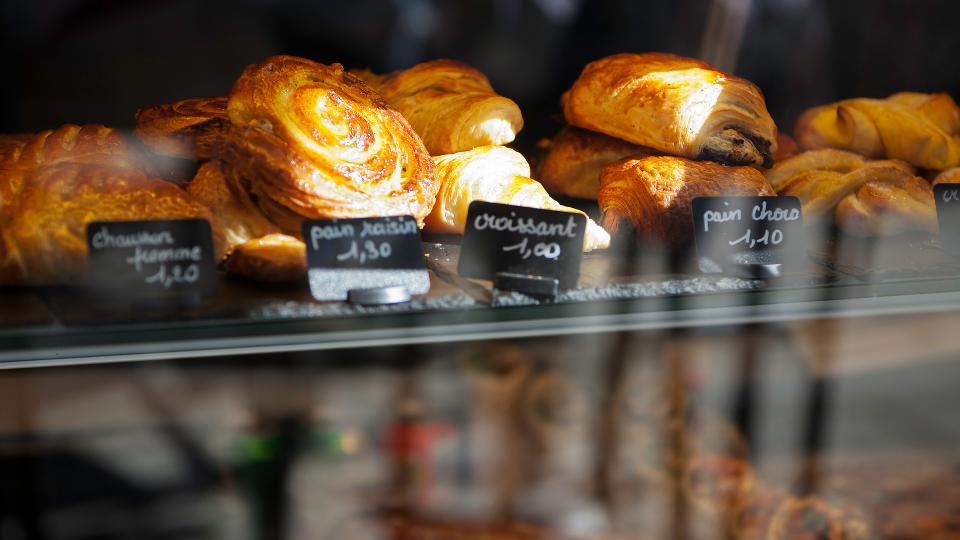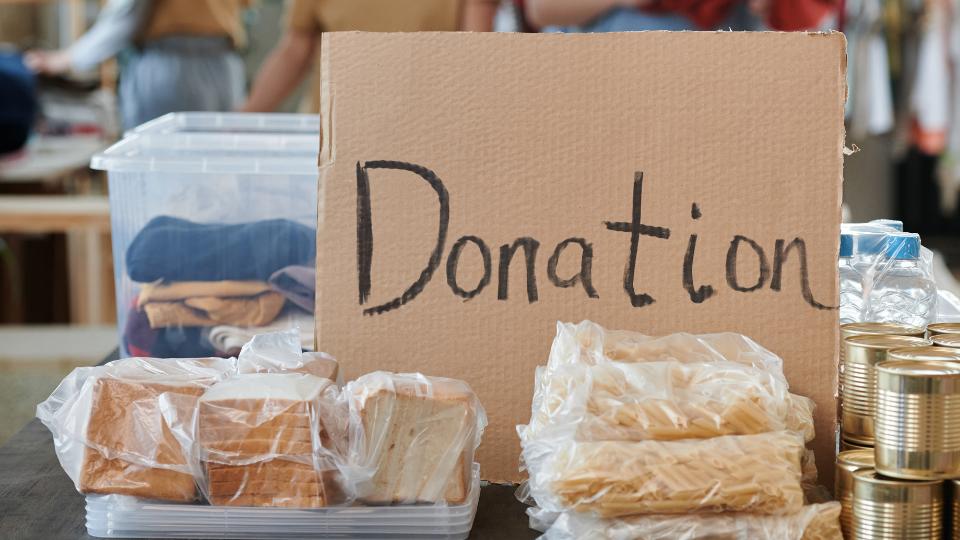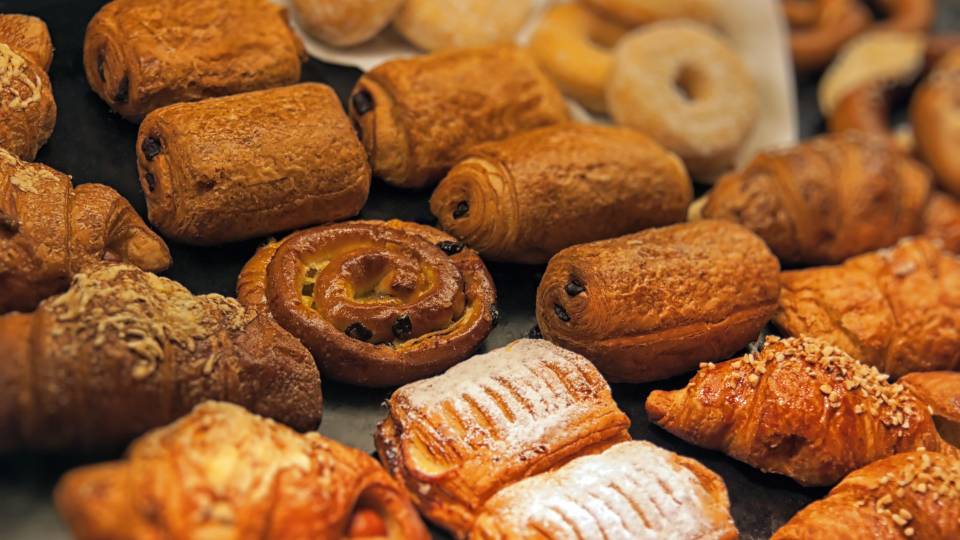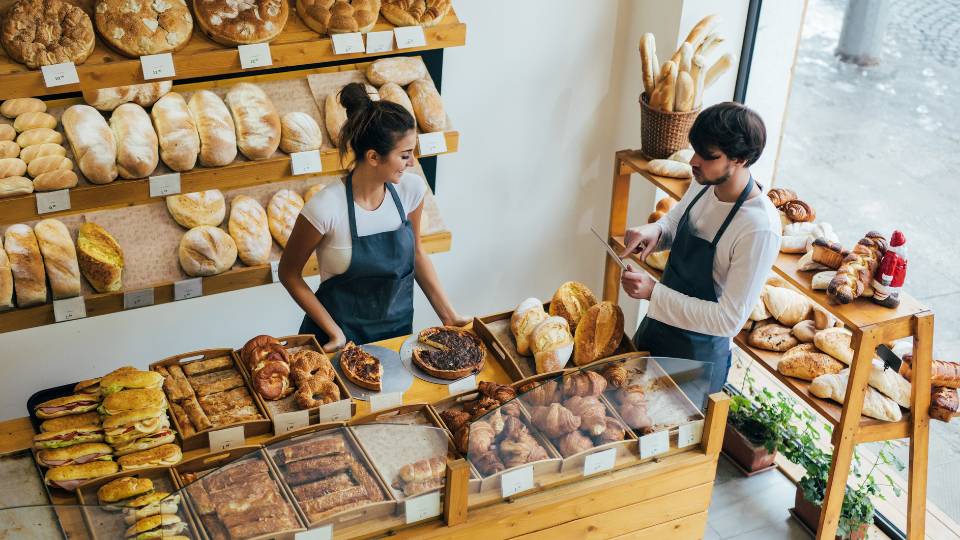
Bakery waste is an important consideration for bakeries in the UK, which all play a crucial role in the food industry, providing a variety of delicious treats to consumers.
Did you know that Greggs has more stores in the UK than McDonald’s or Starbucks?
However, with great taste comes great responsibility, especially when it comes to managing bakery waste.
Don’t crumb-le under the pressure!
In this guide, we discuss everything business owners in need to know about UK bakery waste, from understanding what it is to implement effective disposal strategies.
Table of Contents:
- What is Bakery Waste?
- Bakery Waste Disposal Methods
- How to Reduce Waste in a Bakery
- Bakery Waste Regulations in the UK
- UK Bakery Facts and Statistics
- Conclusion
What is Bakery Waste?
Bakery waste refers to any discarded material generated in the process of baking and selling bakery products.
This can include unsold items, trimmings, expired ingredients, and packaging materials.
Understanding the different types of bakery waste and having the right disposal methods is essential for effective management.
Want to learn more about how to get your bakery to zero-waste? Read our dedicated blog!
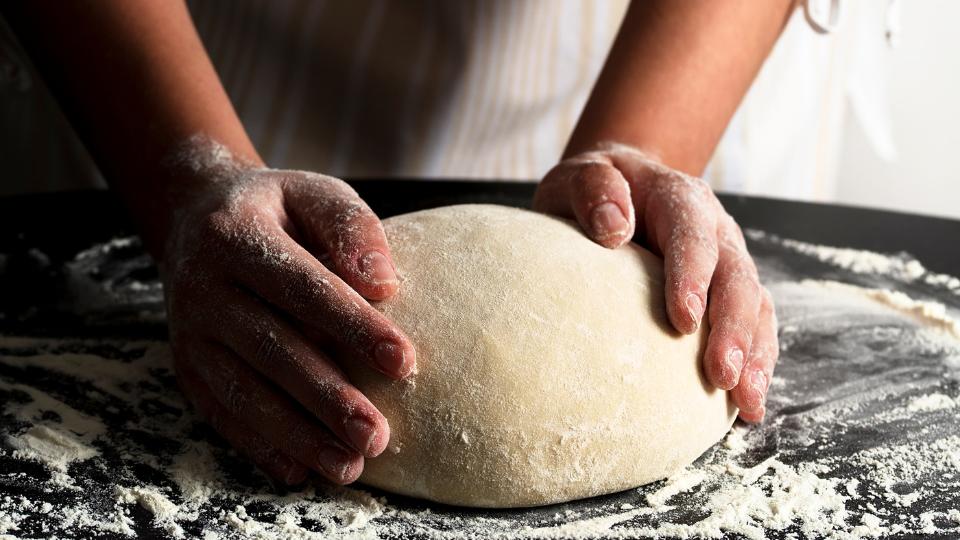
Is Bread Dry or Wet Waste?
Bread is typically considered wet waste due to its high moisture content.
When bread and other bakery products decompose, they release liquid, contributing to the overall wetness of the waste.
Proper disposal methods for wet waste differ from those for dry waste, so it’s crucial to categorise your UK bakery waste accurately.
Bakery Waste Disposal Methods
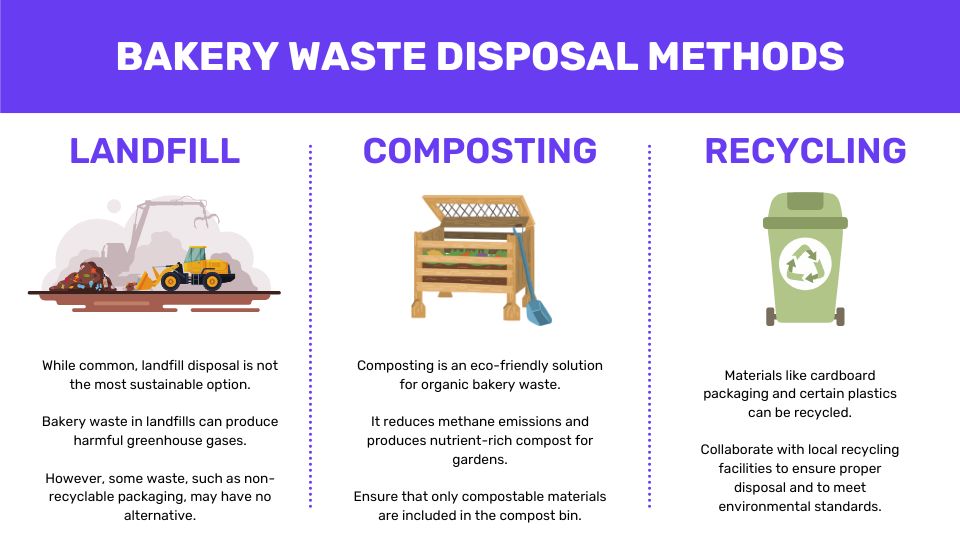
1. Landfill Disposal
While landfill disposal is a common practice for bakery waste, it comes with significant environmental drawbacks.
Your bakery may use a general waste bin to do this.
When bakery waste ends up in landfills, it undergoes anaerobic decomposition, a process that occurs in the absence of oxygen.
This anaerobic breakdown produces methane, a potent greenhouse gas that is approximately 28 times more effective at trapping heat in the atmosphere than carbon dioxide over a 100-year period.
In the context of bakery waste, this means that the discarded products and materials, once destined for landfills, actively contribute to the greenhouse gas problem.
However, it’s important to acknowledge that not all UK bakery waste can avoid landfill disposal.
Non-recyclable packaging, for example, may lack viable alternative disposal methods.
In such cases, businesses must focus on reducing the use of non-recyclable materials where possible and explore eco-friendly packaging alternatives.
By being mindful of the environmental consequences associated with landfill disposal and actively seeking alternatives for different types of waste, bakery owners can take significant strides towards reducing their ecological footprint.
2. Composting
Composting stands out as an eco-friendly solution for managing organic bakery waste.
Unlike landfill disposal, which contributes to harmful methane emissions, composting promotes a sustainable waste management approach with multiple environmental benefits.
One of the key advantages of composting bakery waste is the creation of nutrient-rich compost.
Composting combines bakery leftovers, such as stale bread and trimmings, with other organic materials like fruit and vegetable scraps so that they can break down into a valuable and natural fertiliser that enhances soil structure, fertility, and water retention.
By incorporating this compost into gardens or agricultural settings, bakery owners can contribute to the health of local ecosystems – or even sell it to local agriculture businesses to regain some investment back!
Items such as plastic packaging, which is not compostable, should be separated and directed towards recycling or alternative disposal methods.
By adopting composting practices in bakeries, business owners not only reduce their environmental impact but also actively participate in the creation of a circular economy where waste becomes a valuable resource.
3. Recycling
Recycling presents a sustainable alternative for managing specific bakery waste materials, such as cardboard packaging and certain plastics.
By diverting these materials from landfills, bakery owners not only contribute to environmental conservation but also support the circular economy by turning waste into reusable resources.
Cardboard packaging, commonly used in the bakery industry, is highly recyclable.
To facilitate efficient recycling, it’s essential for bakery owners to implement proper waste segregation practices within their establishments.
While not all plastics are easily recyclable, certain types commonly used in bakery packaging can be recycled.
It’s crucial to identify and segregate recyclable plastics from non-recyclable ones within the bakery waste stream.
Common recyclable plastics include PET (polyethylene terephthalate) and HDPE (high-density polyethylene).
Meeting environmental standards is not only a legal obligation but also a commitment to responsible business practices and staying informed about regional waste management regulations is essential for businesses to make informed decisions and maintain a positive environmental impact.
Commitment to better recycling practices not only benefits the environment but also aligns with the growing consumer demand for businesses that prioritise responsible waste management.
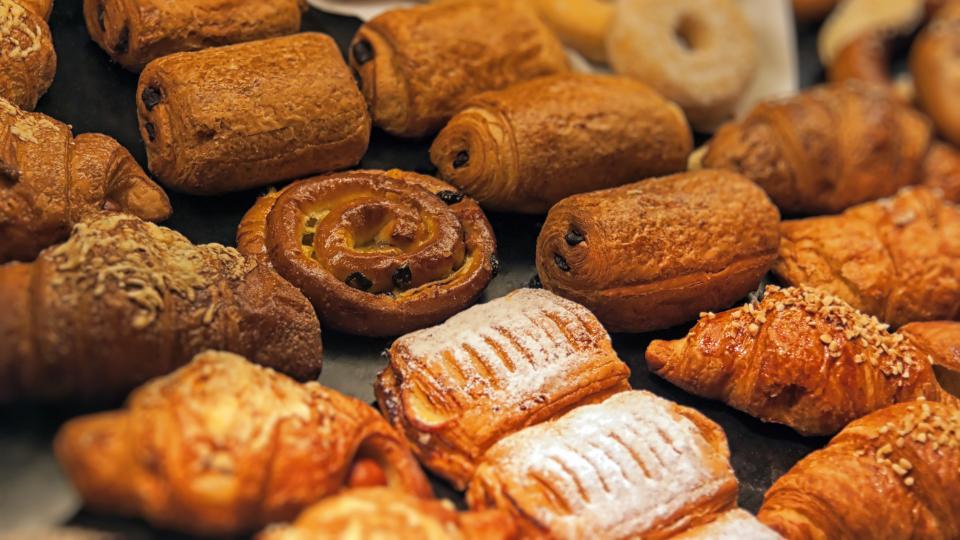
How to Reduce Waste in a Bakery
1. Inventory Management
Implementing a meticulous inventory system is a proactive strategy for bakery owners to minimise overproduction and combat food wastage.
By understanding and adapting to product demand, businesses can strike a balance between meeting customer needs and reducing excess inventory, ultimately creating a more sustainable and efficient operation.
Implementing a meticulous inventory system empowers bakery owners to make informed decisions about production quantities, minimising the likelihood of overproduction and subsequent waste.
By leveraging historical data to understand fluctuating customer preferences and product demand influenced by seasons and events, businesses can regularly assess and adjust production schedules, introduce new items, or optimise recipes, ensuring both sustainability and customer satisfaction.
This strategic approach not only reduces bakery waste but also enhances customer satisfaction by aligning product availability with consumer preferences.
2. Donation Programs
Establishing partnerships with local charities or food banks is a great strategy for bakery owners to reduce waste while making a positive impact on the community.
You can read our blog on how to partner with local charities as a bakery to find out more!
Donating unsold but still edible bakery items not only aligns with sustainable business practices but also addresses food insecurity issues, creates a sense of social responsibility, and positively reflects on your business.
Customers often appreciate businesses that actively participate in community initiatives, so make sure you’re sharing your bakery’s commitment to waste reduction and community support through social media or local news outlets!
Before establishing partnerships, bakery owners should be aware of local regulations and legal considerations related to food donations.
Establishing partnerships with local charities or food banks not only reduces bakery waste but also contributes to a more resilient and compassionate community.
3. Employee Training
Well-informed employees play a critical role in significantly impacting waste management efforts.
It’s important your bakery instigates a training program to communicate the importance of waste reduction and responsible disposal practices to bakery staff.
Emphasise your bakery’s commitment to environmental sustainability and the role that each employee plays in achieving these goals.
Provide clear and concise information on the proper separation of waste into recyclables, compostables, and non-recyclables.
Understanding the three categories ensures that waste is disposed of in the most environmentally friendly manner.
As waste management practices evolve, provide regular updates and refresher courses to keep employees informed about any changes or improvements in the bakery’s waste reduction strategies.
Keeping staff up-to-date ensures that the entire team remains aligned with the bakery’s sustainability goals.
Make sure to praise staff that follow the proper waste management guidelines.
Recognition programs or incentives create a positive feedback loop, encouraging staff members to consistently apply proper waste separation practices.
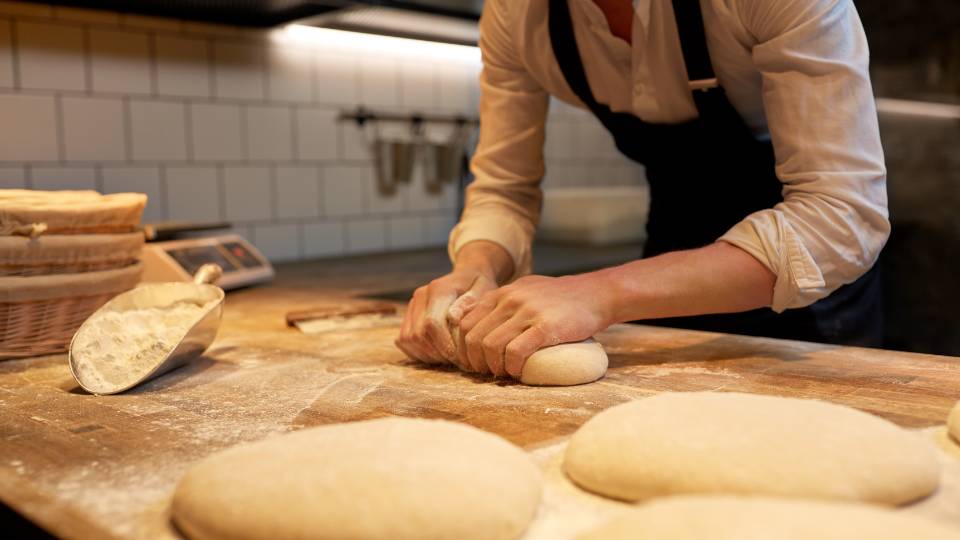
Bakery Waste Regulations in the UK
UK Bakery owners must prioritise understanding and complying with the stringent regulations governing bakery waste.
Failure to do so poses legal consequences.
The Waste (England and Wales) Regulations 2011 and the Waste (Scotland) Regulations 2012 play a pivotal role in outlining legal responsibilities for waste producers, including bakeries.
The recently enacted Environmental Act 2021 further reinforces the UK’s commitment to addressing environmental challenges, including food waste.
It places a heightened emphasis on businesses, including bakeries, to take proactive measures to minimise food waste, with businesses producing over 5kg of food waste per week legally obliged to dispose of it through a food waste bin.
Bakeries are required to classify their waste into distinct categories such as recyclables, compostables, and non-recyclables.
By doing so, they contribute to more effective downstream waste management processes and facilitate the recycling and repurposing of materials.
Accurate and thorough documentation of waste management practices is a key requirement.
Bakeries must maintain records detailing the quantities and types of waste generated, the methods of disposal employed, and any relevant transfer documentation when waste is handed over to third-party waste management services.
This transparency ensures accountability and helps regulatory bodies monitor compliance.
UK Bakery Facts and Statistics
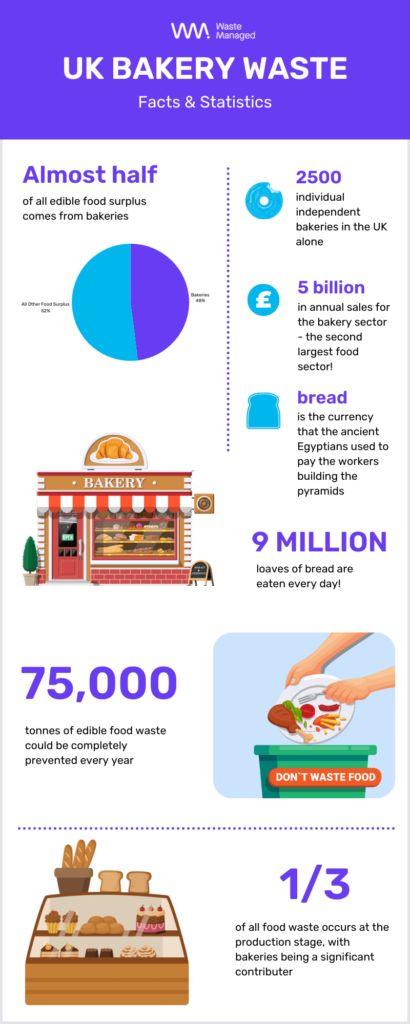
- In a study conducted by WRAP, almost half of all edible food surplus comes from bakeries.
- Bakeries could prevent up to 75,000 tonnes of edible food waste every year.
- About one-third of all food waste (830 million tonnes) occurs at the production stage and bakeries are a significant contributor
Check out our blog on food waste statistics for more!
Conclusion
Effectively managing bakery waste is not only an environmental responsibility but also a business necessity.
By implementing sustainable practices, complying with regulations, and embracing waste reduction strategies, UK bakery owners can contribute to a greener future while maintaining a thriving business.
Share this guide to spread awareness and inspire positive change within the baking industry!

